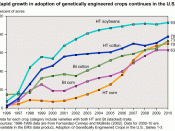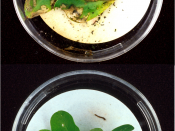Biotechnology in its simplest form means using living things to produce something from raw materials. In its earliest form it was not very controversial. The use of bacteria to make yogurt and cheese, or the use of a special bacterium that kills worms feeding on plants. However, now when someone thinks of biotechnology the thought of splicing new genes and creating new organisms comes to mind. The latter is seen as more controversial because it involves human beings entering in and changing the genetic code, whereas earlier biotechnology involved using organisms in their natural states to aid in the creation or protection of something. Even when a gene-splicing job might have the same results as let's say creating a hybrid plant, the gene-splicing job will always be more controversial with some people. And food of course, since it goes into ones body and is digested creates a great controversy, when it is discovered that perhaps the genes of the food have been modified in a lab, and lets say a growth hormone from a pig has been inserted.
In France, however people seem to react more negatively towards information like this and in general seem to be much less accepting to the use of genetically modified foods than the people of the United States. Their distrust of genetically modified foods can be linked to several things which include: a distrust in government, lack of knowledge about genetically modified foods, the image of the modern farm, and a large number of environmental conservationist.
First, the French have little trust in their governmental bureaucracies. And when it comes to food safety, they have very little trust due to the outbreak of mad cow disease, which the French seem to blame on their government for not putting in safeguards to protect them against such a horrible disease. This mistake by the French government has caused the people of France to lose trust in the government's ability to determine what is safe (Joly and Lemarie 3). Also, this public outcry has caused the French government to have a moratorium on genetically modified foods, because no elected official wants to lose votes because of support for genetic engineering. This has a negative effect on public perception too, because even though the public does not trust the government to have the public's interests in mind when it comes to safety, they have the general impression that when something is indeed banned it must be really unhealthy.
Another contributing factor to the French distrust of genetically engineered foods is that they are not well informed and educated on the subject, although this is not only a French problem, it is a contributing factor to their distrust. In France, the secondary schools focus on a liberal arts curriculum and don't teach much about genetics and technology, leaving the student without a great deal of knowledge in the field of genetics (Dobloff). As a progression of this, most of what is known about genetically modified foods is gained through the media, which tends to only run stories when there is some sort of controversy involving GM foods. This bias tends to lead the public to believe that all these foods are dangerous. If perhaps a French person wants to learn about genetic engineering and it's danger he/she can visit a library or bookstore and find books about the topic. This however would be a very proactive stance that is not used by many people. In addition, some of the books are written in very scientific terms or perhaps English, which would dissuade most people from learning any more information about the topic (Dobloff).
Yet another contributing factor to the French public's views on biotechnology is there cultural view of the Farmer. The French view the modern farm in a much different light than they do the classical farm. They view the classical farmer as a conservationist person that really cares for and loves the Earth; this view is almost a romanticized perception of the farmer (Joly and Lemarie 4). It most likely has its foundation in the socialist ideas of the French, where the personal farmer is the base of the community, and should be respected. However, the modern farm, which is usually run by some large corporation, is viewed in an extremely poor light. The modern farm is thought to be run by people that are only concerned with high yields and money. They are thought to be very anti-environment (Joly and Lemarie 4). This thinking also is rooted in the socialist thinking of the French. The modern farm is considered to be very capitalists, and that it tries to do anything to make a Euro, even put people at risk. The French associate genetic engineering with modern farming because it's new, and funded by large corporations, that are indeed trying to make a profit off of their inventions.
Last, the French are very environmentally conscious. They, like other countries in Europe, have major political parties that are dedicated solely to saving the environment. They view genetic engineering as harmful to the environment because they believe that it may disrupt the natural order, by introducing plants that are more suited to living a certain way and that they would eventually kill off naturally existing species of plants, thus creating a world full of man-made plants. The environmentalists do not want man to intervene in nature and end up destroying things that were created naturally over a great length of time, they want the natural world to be conserved in a state that looks like humans have not touched it.
In conclusion, there are four main contributing factors the French disapproval of genetically modified foods: distrust of the government, lack of knowledge, cultural views on farmers, and the strong environmental conservationist feelings. The French do not trust their government to protect them against dangerous foods due to past occurrences. They, like many around the globe, do not have adequate sources of information about the science behind genetically modified foods, and many receive most of there information from a news that only reports about things going wrong. They have socialist view of the classical farmer that is at the base of society, and the capitalist farmer that tries to gain large profits off of his farm. The French also are very environmentally conscious and view genetic engineering as a threat to the environment.
Works Cited Doblhoff, O. "Educating the European Public for Biotechnology." 5 Oct 2001. 21 Apr 2003 .
Joly, Pierre-Benoit and Stephane Lemarie. "Industry Consolidation, Public Attitude, and the Future of Plant Biotechnology in Europe." 1998. 21 Apr 2003. .





